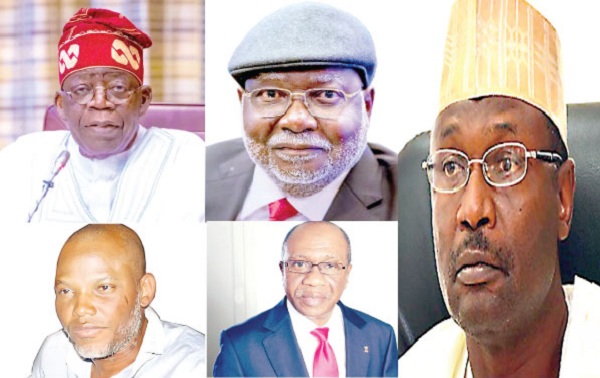
SUNDAY EJIKE takes a look at the happenings in the nation’s judiciary and some landmark judgments in the past 12 months.
The year 2023 started with campaigns for elections into the offices of President, governors, members of the National and State Houses of Assembly. As it has been the characteristics of election year, the courts are flooded with pre-election matters. There are lots of landmark judgments and rulings that emanated from the trial courts, the various divisions of the Courts of Appeal as well as the Supreme Court. Election matters, being time-bound in nature get the attention of all the courts, leaving civil and criminal matters to linger unnecessarily in the docket of the courts.

In the year, 2023, the apex court of the land could not get the full complement of 21 Justices on its Bench due to the deaths of some Justices and retirement of some, after attaining the mandatory retirement age of 70 years. Be that as it may, the Supreme Court made appreciable progress in the appeals brought before it. The Chief Justice of Nigeria (CJN), Justice Olukayode Ariwoola, while addressing a special court session organised to formally herald the 2023/2024 legal year of the Supreme Court of Nigeria and the swearing in of 58 lawyers conferred with the prestigious rank of Senior Advocate of Nigeria (SAN), said, all the tribunals across the country delivered judgments within the time permitted by the Electoral Act and allied subsisting legislations. According to the CJN, a total of 1,271 matters, comprising motions and appeals were filed at the Supreme Court between September 12, 2022 and July 11, 2023, out of which 388 political appeals, 215 criminal appeals, and 464 civil appeals were heard.
Similarly, the court considered a total of 49 criminal motions, 153 civil motions, and two political motions. Between the September 30, 2022 and the July 11, 2023, the Supreme Court delivered 251 judgments. Out of these, 125 were political appeals, 81 were civil appeals and 45 were criminal appeals. Within the period under review, 91 rulings were delivered by the apex Court, a development, the CJN said: “To a very large extent, I will confidently say that this score-card is impressive, fascinating and appreciable in view of the unpleasant events that dotted the legal year, especially the attenuating number of Justices on the Supreme Court Bench, which has to do with some challenges that could not easily be surmounted by one arm of government alone.”
Justice Ariwoola, who will bow out of service before his retirement next year said, the independence of the judiciary must be given adequate statutory protection, not just at the federal level alone but equally at the State level. He added that the rule of law and the holistic independence of the judiciary should always be cherished by all and promised do everything within his ability to make it remain part of his responsibility to nourish.
“The judiciary, as it is today, is more deserving of public trust and confidence than ever before; and we are poised to reposition it for effective justice delivery to make our beloved country a destination of note in the observance of the rule of law and tenets of constitutionalism,” he said.
His promise that the Supreme Court of Nigeria will soon get the constitutionally-prescribed full complement of 21 Justices came to fruition recently following the recommendation by the National Judicial Commission (NJC) of 11 Justices of the Court of Appeal for appointment into the Bench of the Supreme Court. The Justices, who were cleared by the National Assembly recently await swearing in by the CJN.
In the same vein, the Federal High Court, in the last legal year had 15, 025 filed before it by litigants out of which 12, 870 were effectively disposed off leaving a balance of 2, 155 cases still on ground. The court carried over 142, 755 cases from 2021 to 2022 legal year. In 2023 legal year alone, 15, 025 fresh cases were filed by various categories of litigants. Checks revealed that the court would be going into the new legal year with the 144, 910 suits. The breakdown of the carry over cases showed that 42, 784 are civil cases, 36, 061 criminal matters, 41, 447 are motions while 24, 618 are Fundamental Rights Enforcement suits.
At a special court session of the Court of Appeal held in September to mark the commencement of its 2023/2024 legal year, The President of the Court, Justice Monica Dongban-Mensem disclosed that over 39, 526 appeals are currently pending before the court. The bulk of the cases, which were filed in 20 Divisions of the Court, bordered on electoral disputes.
The implication is that commercial matters are tied down in our Courts. Industrial disputes and land matters which when determine in good time could create jobs and release cash flow into the economy are tied down in Court Registries.
It would be recalled that, after the 2023 general election, 98 panels were constituted across the various tribunals tasked with the responsibility to handle 1, 209 petitions that were filed. Among these petitions, five were directed at the Presidential Election Petition Court (PEPC), 147 for the senatorial election, 417 for the House of Representatives, 557 associated with the State Houses of Assembly, while 83 were on gubernatorial elections. 28 states participated in the governorship elections, and petitions were filed in 24 states. Whereas, a total of 7,295 appeals and 3,665 Motions were filed before the court within the 2022/2023 legal year, 3,765 of them were determined while 5,617 motions were disposed of. While 1,030 of these Appeals were dismissed and 10,381 were allowed, the Court still has a total of 39,526 Appeals pending as at August 31, 2023.
There is no doubt that the judiciary was in the eyes of Nigerians throughout 2023, probably because it was an election year and its roles in the democracy of the country, being the final “bus-stop” in election disputes. The first landmark judgment to note is the judgement of the Presidential Election Petition Court (PEPC) and the Supreme Court on the 2023 election which held in February 28. The PEPC, which was set up by the President of the Court of Appeal, Justice Monica Dongban-Mensem in accordance with the law, on September 6, dismissed petitions brought before it by the Peoples Democratic Party (PDP), its presidential candidate, Alhaji Atiku Abubakar and the candidate of the Labour Party (LP), Mr Peter Obi, his party and the petition by the Allied Peoples Movement (APM) challenging the declaration of Bola Tinubu as the winner of the presidential election. The five-member panel of Justices of the PEPC, led by Justice Haruna Tsammani had, in the judgement, affirmed the election of Tinubu. The subsequent appeals at the Supreme Court solidified Tinubu’s election victory, as the apex court affirmed the judgement of the PEPC.
Judgments in the Gubernatorial and National Assembly Election Petitions and Appeals were another round of landmark judgments to note. Many appeals from gubernatorial and national assembly elections emerged. Court decisions upheld victories for some politicians while others, awaited the Supreme Court’s final judgment. The treason charge slammed against the leader of the proscribed Indigenous People of Biafra (IPOB), Nnamdi Kanu gripped the nation. The Supreme Court in its judgment reversed an earlier judgment and ordered Kanu to face trial on treasonable charges before the Federal High Court in Abuja.
The apex court, in the judgement agreed that the IPOB leader was unlawfully renditioned into the country from Kenya and held that, his trial cannot be terminated on the strength of that. The judgement prompted widespread attention and discussions. The Federal High Court on its part had, in a landmark judgment in July, ordered the disclosure of the spending details of about USD$5 billion Abacha loot by the governments of former presidents Olusegun Obasanjo, Umaru Musa Yar’Adua, Goodluck Jonathan and Muhammadu Buhari. The court ordered the government of President Tinubu to “disclose the exact amount of money stolen by General Sani Abacha from Nigeria, and the total amount of Abacha loot recovered and all agreements signed on same by the governments of former presidents Obasanjo, Yar’Adua, Jonathan and Buhari.”
The judgment was delivered by Justice James Kolawole Omotosho following a Freedom of Information suit number: FHC/ABJ/CS/407/2020, brought by the Socio-Economic Rights and Accountability Project (SERAP). In his judgment, Justice Omotosho held that “In the final analysis, the application by SERAP is meritorious and the Federal Government through the Ministry of Finance is hereby ordered to furnish SERAP with the full spending details of about $5bn Abacha loot within seven days of this judgment.” Justice Omotosho ordered the government to “disclose details of the projects executed with the Abacha loot, locations of any such projects and the names of companies and contractors that carried or carrying out the projects since the return of democracy in 1999 till date.”
In December, a Federal High Court in Abuja convicted and sentenced four Boko Haram financiers. They are Modu Aisami, Zana Zarama, Umar Mohammed and Bunu Kame.
The prosecution, led by the Attorney General of the Federation (AGF) and Minister of Justice, Prince Lateef Fagbemi (SAN), secured their convictions after their separate arraignments before Justice Binta Nyako and Justice Emeka Nwite.
The defendants pleaded guilty to the charges and begged the court for leniency. While some were sentenced to 20 years imprisonment, others bagged ten years jail term for providing funds for the terrorist group by buying food products from the group, having reasonable grounds to believe that the proceed will be used to commit a terrorist act therefore committed an offence contrary to Section 13(1)(a)(ii) of the Terrorism Provision Amendment Act, 2013.
One significant judicial ruling was the extension of the lifespan of the N1000, N500 and N200 notes that were redesigned during the reign of President Buhari. The decision of the apex court, which followed the request by the Federal Government attracted national interest. The Supreme Court’s directive, in its judgment, extended the coexistence of old and new notes, alleviating concerns of currency scarcity and ensuring a smoother transition period. A seven-member panel of Justices of the apex court, led by Justice John Okoro, ordered that the old notes remain legal tender until necessary facilities are put in place for their replacement. This means that the old notes, shall co-exist as legal tender with the new/redesigned ones.
Also of note is the judgement of the Court of Appeal, setting aside the October 9 judgment given by Justice Donatus Okorowo of the Federal High Court, Abuja nullifying the nomination of Timipre Sylva as the candidate of the All Progressives Congress (APC) in the November 11, Bayelsa State governorship election. A three-member panel of the appellate court held, in a judgment that the trial court lacked the jurisdiction to have heard and determined the case filed by Demesuoyefa Kolomo, who described himself as a registered voter and member of the APC. The court held that having not been an aspirant, who participated in APC’s governorship primary, Kolomo lacked the locus standi to approach the court to challenge the nomination of the party’s candidate. It proceeded to set aside the Federal High Court judgment, allowed the appeal filed by Sylva and granted all the reliefs sought. The court also awarded N1 million cost in favour of Sylva.
The on-going trial of former Governor of the Central Bank of Nigeria (CBN), Godwin Emefiele before an Abuja High Court is one of the pending high profile cases in 2023. Emefiele was put on trial by the Federal Government through the Economic and Financial Crimes Commission (EFCC) on six counts, bordering on alleged breach of procurement procedure in the award of the contract. The ex-CBN chief was accused of conferring corrupt advantages on a staff of CBN, Mrs Saadat Ramallan Yaro through awards of vehicle supply contracts worth over N1.2 billion contrary to section 19 of the Corrupt Practices and other Related Offences Act 2000. Emefiele, who had denied the six-count criminal charges, has been granted bail by the court.
The AGF and Justice Minister, Fagbemi (SAN) had, in an event in Abuja expressed the readiness of the administration of President Tinubu to implement judicial reforms with the cooperation of the judiciary. The Chief Law Officer of the country said the Federal Government is waiting for the judiciary to set the ball rolling to enable the other arms play their part in the critical aspect of nation building. So, quite a number of high profile cases will be on the front burner in the new year, 2024.








